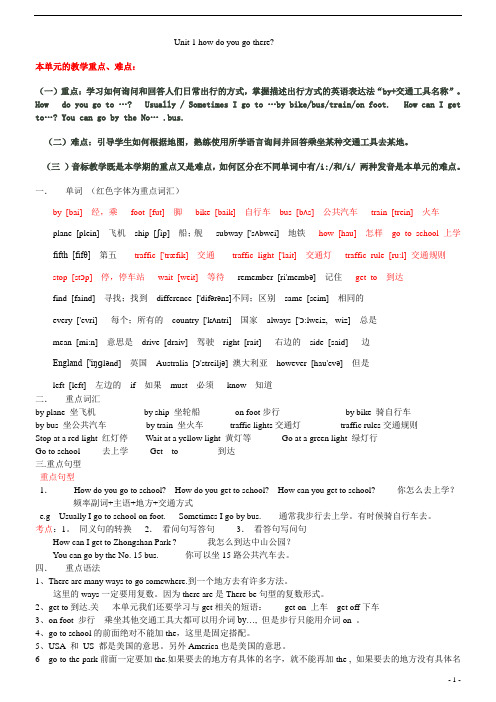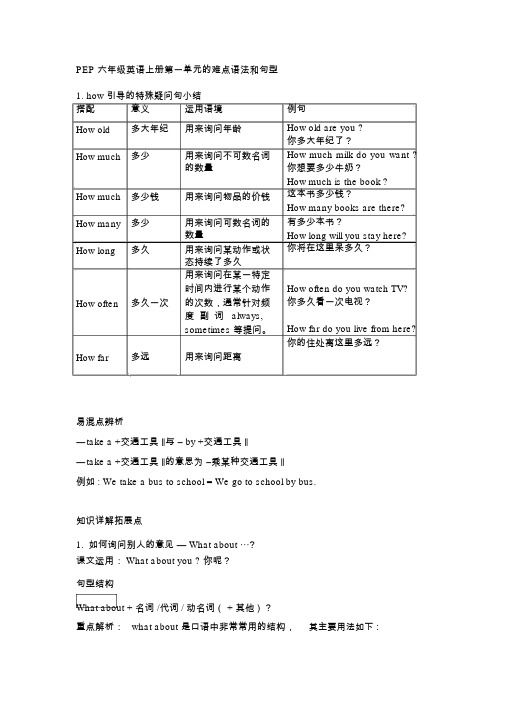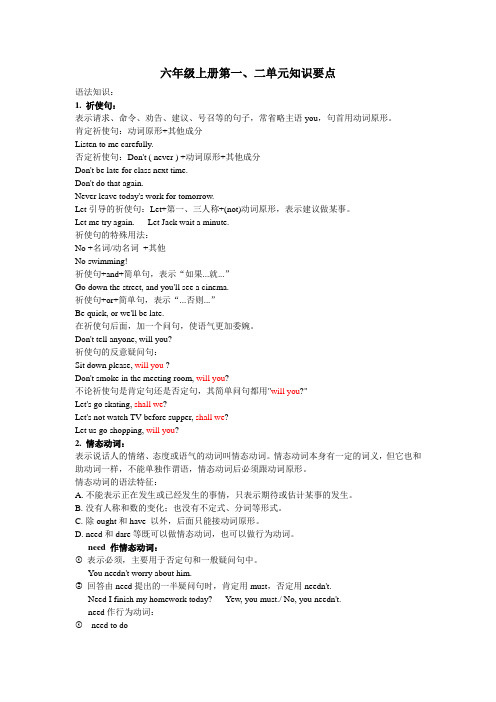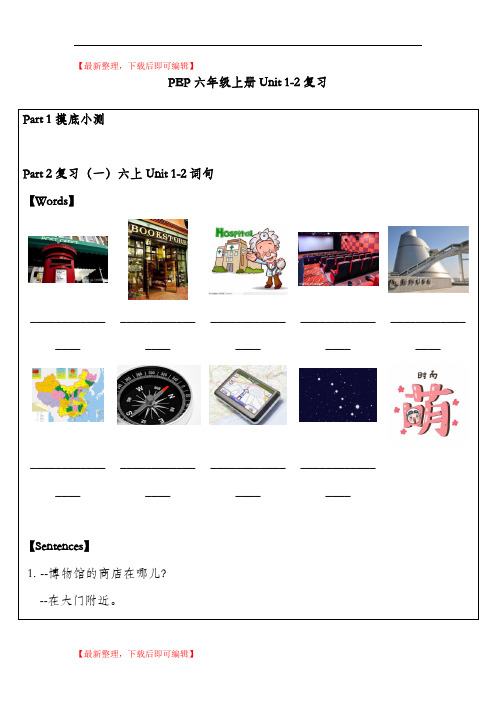Pep 六年级 unit1-2复习提纲
- 格式:ppt
- 大小:76.00 KB
- 文档页数:6

Unit 1 how do you go there?本单元的教学重点、难点:(一)重点:学习如何询问和回答人们日常出行的方式,掌握描述出行方式的英语表达法“by+交通工具名称”。
How do you go to …? Usually / Sometimes I go to …by bike/bus/train/on foot. How can I get to…? You can go by the No… .bus.(二)难点:引导学生如何根据地图,熟练使用所学语言询问并回答乘坐某种交通工具去某地。
(三)音标教学既是本学期的重点又是难点,如何区分在不同单词中有/i:/和/i/ 两种发音是本单元的难点。
一.单词(红色字体为重点词汇)by [bai] 经,乘foot [fut] 脚bike [baik] 自行车bus [bʌs] 公共汽车train [trein] 火车plane [plein] 飞机ship [ʃip] 船;舰subway ['sʌbwei] 地铁how [hau] 怎样go to school 上学fifth [fifθ] 第五traffic ['træfik] 交通traffic light ['lait] 交通灯traffic rule [ru:l] 交通规则stop [stɔp] 停,停车站wait [weit] 等待remember [ri'membə] 记住get to 到达find [faind] 寻找;找到difference ['difərəns]不同;区别same [seim] 相同的every ['evri] 每个;所有的country ['kʌntri] 国家always ['ɔ:lweiz, -wiz] 总是mean [mi:n] 意思是drive [draiv] 驾驶right [rait] 右边的side [said] 边England ['iŋɡlənd] 英国Australia [ɔ'streiljə] 澳大利亚however [hau'evə] 但是left [left] 左边的if 如果must 必须know 知道二.重点词汇by plane 坐飞机by ship 坐轮船on foot步行by bike 骑自行车by bus 坐公共汽车by train 坐火车traffic lights交通灯traffic rules交通规则Stop at a red light 红灯停Wait at a yellow light 黄灯等Go at a green light 绿灯行Go to school 去上学Get to 到达三.重点句型重点句型1.----- How do you go to school? How do you get to school? How can you get to school? 你怎么去上学?---- 频率副词+主语+地方+交通方式e.g Usually I go to school on foot. Sometimes I go by bus. 通常我步行去上学。

PEP 六年级英语上册第一单元的难点语法和句型1.how 引导的特殊疑问句小结搭配意义运用语境How old多大年纪用来询问年龄How much多少用来询问不可数名词的数量How much多少钱用来询问物品的价钱How many多少用来询问可数名词的数量How long多久用来询问某动作或状态持续了多久用来询问在某一特定时间内进行某个动作How often多久一次的次数,通常针对频度副词 always,sometimes 等提问。
How far多远用来询问距离例句How old are you ?你多大年纪了?How much milk do you want ?你想要多少牛奶?How much is the book ?这本书多少钱?How many books are there?有多少本书?How long will you stay here?你将在这里呆多久?How often do you watch TV?你多久看一次电视?How far do you live from here?你的住处离这里多远?易混点辨析―take a +交通工具‖与― by +交通工具‖―take a +交通工具‖的意思为―乘某种交通工具‖例如 : We take a bus to school = We go to school by bus.知识详解拓展点1.如何询问别人的意见— What about ⋯?课文运用: What about you ? 你呢?句型结构What about + 名词 /代词 / 动名词( + 其他)?重点解析:what about 是口语中非常常用的结构,其主要用法如下:a.用于提出建议例如:What about some juice? 来些果汁怎么样?b.用于询问对方的意见。
例如:I’d like a hamburger. What about you ?我想要个汉堡包。

六年级上册第一、二单元知识要点语法知识:1. 祈使句:表示请求、命令、劝告、建议、号召等的句子,常省略主语you,句首用动词原形。
肯定祈使句:动词原形+其他成分Listen to me carefully.否定祈使句:Don't ( never ) +动词原形+其他成分Don't be late for class next time.Don't do that again.Never leave today's work for tomorrow.Let引导的祈使句:Let+第一、三人称+(not)动词原形,表示建议做某事。
Let me try again. Let Jack wait a minute.祈使句的特殊用法:No +名词/动名词+其他No swimming!祈使句+and+简单句,表示“如果...就...”Go down the street, and you'll see a cinema.祈使句+or+简单句,表示“...否则...”Be quick, or we'll be late.在祈使句后面,加一个问句,使语气更加委婉。
Don't tell anyone, will you?祈使句的反意疑问句:Sit down please, will you ?Don't smoke in the meeting room, will you?不论祈使句是肯定句还是否定句,其简单问句都用"will you?"Let's go skating, shall we?Let's not watch TV before supper, shall we?Let us go shopping, will you?2. 情态动词:表示说话人的情绪、态度或语气的动词叫情态动词。
情态动词本身有一定的词义,但它也和助动词一样,不能单独作谓语,情态动词后必须跟动词原形。

人教版六年级上册英语1-3单元知识归纳Unit 1:In the first unit, we learn about personal information and greetings. We learn how to introduce ourselves and ask others for their names. We also learn about nationality and how to say where we come from. Additionally, we learn how to greet others and how to say goodbye. We practice simple conversations using these phrases and learn how to express basic needs and preferences.Unit 2:In the second unit, we focus on classroom objects and school subjects. We learn the names of common objects found in a classroom such as books, pens, desks, and chairs. We also learn the names of different school subjects like math, science, and English. Additionally, we learn how to talkabout our schedule or timetable and express what subjects we have on certain days.Unit 3:The third unit is all about hobbies and free time activities. We learn how to talk about our favorite hobbies and activities. We learn vocabulary related to sports, music, and games. We also learn how to express our likes anddislikes using "I like" and "I don't like" phrases. Moreover, we learn how to ask others about their hobbies and engage in simple conversations about our common interests.Throughout these units, we practice listening, speaking, reading, and writing skills. We engage in various activities such as role-plays, pair work, and group discussions to enhance our communication abilities. By the end of these units, we should be able to confidently introduce ourselves, communicate basic personal information, talk about school life, and discuss hobbies and interests.。

Unit1How tall are you?一、核心词汇互为反义词的比较级:shorter更矮的/更短的—taller更高的/longer更长的older更年长的—younger更年轻的thinner更瘦的—stronger更强壮的/heavier更重的bigger更大的—smaller更小的拓展词汇——形容词比较级:1.形容词比较级一般情况下直接在原级词尾加-er。
如:clean—cleaner;2.以不发音的e结尾的单词直接加-r。
如:large—larger nice—nicer;3.以“辅音字母+y”结尾的单词变y为i,再加-er。
如:easy—easier busy—busier happy—happier funny—funnier;4.以重读闭音节结尾的单词,要先双写词尾的辅音字母,再加-er。
如:red—redder fat—fatter sad—sadder;5.不规则变化。
如:good—better bad—worse many—more little —less6.多音节词和部分双音节词则在词前加more。
如:beautiful—more beautiful exciting—more exciting二、了解词汇dinosaur恐龙hall大厅metre米(美式英语:meter)than比both两个都kilogram千克;公斤countryside乡村lower(low的比较级)更低地shadow阴影;影子smarter(smart的比较级)更聪明的become开始变得;变成三、核心句型1.—How tall are you?你有多高?—I’m1.64metres.我身高1.64米。
2.—What size are your shoes,Mike?迈克,你穿多大号的鞋?—Size7.7号。
3.—How heavy are you?你体重多少?—I’m48kilograms.我体重48公斤。

【最新整理,下载后即可编辑】
PEP
六年级上册Unit 1-2复习
Part 1摸底小测
Part 2复习(一)六上Unit 1-2词句
【Words】
____________
____
____________
____
____________
____
____________
____
____________
____
____________
____
____________
____
____________
____
____________
____
【Sentences】
1.--博物馆的商店在哪儿?
--在大门附近。
2.--我们怎么到那儿?
--到书店左转。
3.--你怎么来学校的?
--通常我走路来。
4.别闯红灯!
5.我必须注意交通信号灯!
Part 3复习(一)六上Unit 1-2语法
【一般现在时】
Part 1 定义
一般现在时是用于表示通常性、规律性、习惯性状态或动作的一种时态。
Part 2 一般现在时的使用情况
(1)表示有规律的、习惯性的动作(比如每天去上学,每周五要去踢足球,喜欢某人或某物等)
例句:Xiaoxin goes to school at 7a.m. every morning.
I usually come on foot.
(2)表示人或物目前的状态
例句:I am a boy but you are a girl.
There are 4 apples on the table.。
六年级上册1-3单元知识点Unit1 How can I get there? (你怎样去那里?)重点单词:where哪里library图书馆science museum科学馆bookstore书店post office邮局hospital医院cinema电影院near旁边next to旁边(比near更近)in front of在…的前面behind在...的后面Excuse me打扰一下please请far from离…远的buy 买want to想要get on上车get off下车on the left在左边on the right在右边east东south南west西north北turn left左转turn right右转go straight直走am上午pm下午now现在tell告诉look for寻找重点句子:1.Where is the cinema, please? 请问电影院在哪?2.It’s next to the hospital. 它在医院的旁边。
3.Is it far from here? 它离这远吗?4.It’s east of the cinema. 它在电影院的东面。
5.How can we get there?6.Turn left at the cinema, then go straight. It’s on the left. 在电影院左转,然后直走,它在左边。
重点知识:1.问路之前,出于礼貌,我们要说“Excuse me”与后面的句子要用标点符号隔开。
2.Is there 开头的问句怎么回答呢?例如:Is there a cinema near here? 只要把前两个词语的顺序换一下就可以了,肯定回答是:Yes, there is. 否定:No, there isn’t.3.buy 和by的区别,这两个词语发音相同,但是意思完全不同,by:乘,坐buy:买4.地点名词前面一定要有the,例如:Where is the cinema? How can I get to the hospital?5.时间前面用at. 例如:在三点钟:at 3 o’ clock.;一段时间前面用for,例如:三分钟for 3minutes. 星期前面用on,例如:on Monday, on Tuesday, on Wednesday, on Thursday, on Friday, on Saturday, on Sunday.6.在表达第几路公交车时,注意No. 的书写,N要大写,后面别少了一点!!!7.在哪里上下车,在哪里左右转,都用介词at,例如:Get on/ off at the cinema. 在电影院的地方上下车。
六年级Unit1---2知识总结乐学辅导中心一.重点短语Unit1 Being polite1.meet new people 遇见生人2.answer the phone 接电话3.walk on busy streets 走在繁忙的大街上4.wait for a bus等公交车5.shake hands 握手6.talk to sb与…交谈7.hug people 拥抱8.say“hello”说“您好” 9.take amessage记录留言10.say “Excuse me “说“歉”11.line up 排队12.don’t push不要推挤 13.thefirst time第一次 14.arrive in/at 到达15.write …down 记下…,写下… 16.see you tomorrow明天见17.have a fever 发烧 18.have a test 举行考试 19.findout 找出,发现 20.lose a game输掉一场比赛21.make a mistake 犯错 22.make a deal成交Unit 2 Fire safety23. worry about…着急,担心… 24.hear the fire alarm听到火警25.get up quickly 迅速起床 26.leave the room离开房间27.don’t take your things 不要拿你的东西 28.take the lift乘电梯29.walk down the stairs quickly 快速走下楼梯 30.a loud noise 一声巨响30.get out of the building 走出大厦31. call 119打11932.put out the fire 灭火33.What happened?发生了什么事?34.the fire alarm 火警35.look out of the window 看窗外36.see smoke 看到烟37.play with …和…玩38.You are right. 你说的对 . 39.in the kitchen 在厨房40.a long time ago很久以前 41.from 7am to 7pm从早七点到晚七点42.thank sb for … 因…感谢某人 thank sb for doing sth 感谢某人做…43.be careful 小心 44.turn on /off 打开/关掉45.fire drill 消防演习 46.at first最初,首先二.重要句型Unit11 . How should I …? /How should I answer the phone ?我应该怎样….?我应该怎样接电话?2. What should I do when I meet new people? 我见到生人应该做什么?3. When you meet older people, you should shake hands with them. 当你见到年长的人,你应该和他们握手。